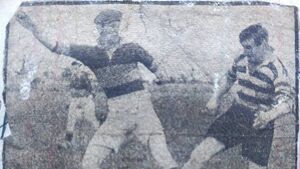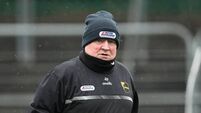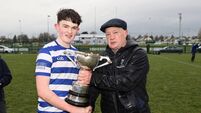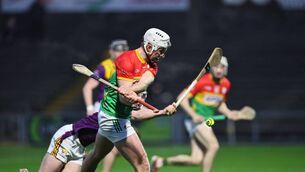Better be wise in foresight

Yes, yes, we know that that ‘better be wise in foresight’ headline doesn’t sit comfortably and that the phrase ye are all familiar with is ’’tis easy to be wise in hindsight’ or, to quote Sherlock Holmes in one of Arthur Conan Doyle’s detective stories, “It is easy to be wise after the event.” Very true, too. How many games of ’25’ were ‘won’ down the decades during the post-mortem held as the dealer distributed the cards for the next hand?!
And sure, the barstool pundits ALWAYS know what moves the selectors should and shouldn’t have made to win a hurling or football match. Indeed, just last week I was told of a simple switch that should have been made in an All-Ireland Hurling final played nigh on half a century ago.
And, you know, even at 49 years remove, I reckoned the man had a valid argument. Thing is the selectors had to act on the spur of the moment in a throbbing Croke Park whereas we had five decades to come up with the argument that when Cork moved Jimmy Barry Murphy to centre half forward and on to a heretofore rampant Mick Jacob in the 1976 Liam MacCarthy Cup decider, Wexford should have detailed his marker Colm Doran, who often played the No 6 position for his club, to follow him.
You see the wily Barry Murphy, anonymous enough up to then, raced away from a tiring Jacob to string a priceless necklace of points together as the Rebels inched to a four-point victory.
Christy Ring, a Cork selector, was credited with the masterstroke. Now Mick Jacob gave one of the finest exhibitions of centre half back play ever seen that first Sunday in September.
I can vividly recall standing on a packed Canal End with my teenage Carlow Hurling Club colleagues and exclaiming at one stage “he has it again” as the purple and gold defender caught and cleared yet another ball.
Let’s say Wexford did make the move mooted last week, Jacob shifted to the wing but JBM, with more space to work with leaves Doran in his wake and careers through for a goal? Then the argument half a century later would be they should have left well enough alone! Yes indeed, Holmes was right, “it is easy to be wise after the event” or as the same detective, having solved a crime, often said - but Conan Doyle never wrote! - “elementary my dear Watson!”
Yes, yes, once again dear reader, we are aware that that ‘Foresight’ appears incorrect, that it should read ‘The Forstye Saga’, a series of novels written by John Galsworthy that was turned into a popular television series in the late 1960s, a series I remember my late parents following with keen interest.
However, it is indeed a ‘Foresight Saga’ we write of this week as we are seeking you, the readers, help on a project we are working on, a project which is all but complete apart from, as they say, dotting the i’s and crossing the t’s. But it is in that dotting and crossing we require assistance with and would appreciate any information readers may have BEFORE this project is brought to fruition.
THE PROJECT?
What is this project you ask? Well, let’s reveal ‘The Supplement Proposal’ your scribe sent to Sports Editor Ger McNally a few weeks ago. “EVERY KICK OF THE BALL’ - From the archives of ‘The Nationalist’, Carlow’s century old paper of record we bring you … Every single result from 136 years of the Carlow Senior Football Championship action {1889-2025} … All the dates, all the venues, an invaluable resource for future historians … All the county final lineouts and referees … A picture Gallery of Champions. 16 pages choc-a-bloc with previously unpublished records.” I’m glad to say the proposal got the green light, glad to say too the page count has been increased to 24 and the publication date set for shortly before Christmas.
Now while most of the research work has been done and a template will soon be set in place there are a few items of fact that need clarification and/or correction while we also have a few gaps here and there that the newspaper archive failed to unearth but that maybe local knowledge might reveal?
For instance, does anyone know who captained Ballymurphy to the 1947 title? Or more recently, the Éire Óg captains in 1974, ’76 and ’78?
Our list of county final referees back to day one is almost complete but 1957 (Leighlinbridge v The Gaels) and 1959 (Tullow v Kildavin) are notable exceptions.
Does any old-timer recall who took charge of those two finals. If so, please make contact by e-mail to asirovedout25@gmail.com.
Ditto is a word that has become almost obsolete on the printed page. It and it’s shortened version ‘Do’ mean “the same” or “as before” and indicates repetition or to refer to a previously mentioned item. For instance, when the names of a county team were published you might read “Leo Hughes (Ballinabranna), Johnny Byrne (Do) …” which gave the message Byrne was of the same club as the previously named Hughes.
We believe that mistaken use of the same ditto, or more precisely the ditto mark, “, bestowed on Loughmartin Emmet's a mythical Carlow SFC four-in-a-row. The Emmets definitely won the championship in the calendar year 1898 (this could quite possibly have been the 1897 competition) but we can find absolutely no record of the championship being played in 1899 or 1900 and believe that careless use of ditto gifted Loughmartin, a townsland close to Tullow, legendary status.
However, if someone out there has a family heirloom of a SFC medal from any of those ‘doubting Thomas’ years we’d love to hear from you.
Played 38, Won 33, Drew 1 (a scoreless draw), Lost 4 (3 on the field of play, one in the boardroom). Impressive statistics you’ll agree. And, no, the stats do not relate to a cross-channel soccer team near the end of a long, successful campaign. Rather do those figures tell the tale of Graiguecullen’s 22-year sojourn in the Carlow Senior Football Championship, a sojourn which began as Carlow-Graigue in 1905 and came to a controversial conclusion in 1926.
During the course of those 38 games the famed Young Ireland’s garnered 13 SFC titles but we are stymied on one, the 1914 final against Tinryland, a game fixed for Ballon in the February of 1915. It wasn’t played that day as Graigue didn’t put in an appearance and the Tinryland notes in this paper that week suggested they should be awarded the title.
However, it is Graiguecullen who are credited with the 1914 SFC though we can find no record of a re-fixture. The clubs did meet in the first round of the 1915 championship in September, Graigue winning 3-4 to 2-2 and could it me that this result was taken as deciding the destination of the ’14 crown?
Again, if any folklore survives concerning that championship we’d be delighted to hear from you.
Right, when I was a boy and listening to the old men talk football and Carlow football in particular the ‘Battle of Rathoe’ loomed large in their conversations, the rights and wrongs of the sad affair debated strongly.
It is not the intention here to dwell on the battle but to question two ‘facts’ relayed by those old-timers. The first was that while Graiguecullen were suspended and subsequently accepted the invitation to play in the then Queens County (now Laois), the 1926 Carlow SFC was declared Null and Void.
The second connected story was that as the championship had been declared null and void, the County Board, strapped for cash, presented the senior medals to Fenagh, the winners of the 1926 Junior Football Championship.
Yet in Fr Lawler’s iconic history of Carlow GAA (and the man who as Chairman of the Carlow Co Board at the time was in the eye of the storm) he states Milford were awarded the title. And the Haughney Cup, then the symbol of Carlow football supremacy, and currently on display in the County Museum on Tullow Street, provides further evidence of Milford’s claim to the 1926 title as their name is proudly etched on the plinth alongside 1926!
So, were the stories the old men told urban myths? Has someone of Milford persuasion a 1926 SFC medal? Or maybe someone in Fenagh has a 1926 ‘SFC’ medal? Again, we’d love to hear from you at asirovedout25@gmail.com.
In the ‘Stripy Men’, a fantastic book on Kilkenny’s hurling story, published in 2009, historian PM O’Sullivan in a chapter entitled “Writing it Down; or a Collation Once Again’ wrote what I believe should be the gospel for all GAA historians. Beginning with a definition of collate - to examine and compare carefully (texts) in order to note points of difference and agreement,” he went on to quote from Seamus Heaney’s ‘An Open Letter’ in which the poet writes “Names were not for negotiation/Right names were the first foundation/For telling truth.”
O’Sullivan adds “it is a text all sports historians could consult with profit.” There will be lots of names in our football supplement and we want to get as many of them right as possible. And we are not happy with initials, we’d prefer to know if P Murphy, the goalkeeper on Kilbride’s 1935 championship winning team was Paddy, Peter or Paul? Take a look at the 1948 action shot accompanying this column. Does anyone know who the two players are? We want to get the spelling of christian names and surnames correct too.
For instance, we are aware there are Eamon’s and Eamonn’s, Walsh’s and Walshe’s, Donoghue and Donohoe’s. It is impossible, we realise, to get everything 100% correct, especially when our research goes all the way back to 1889 but we hope that this week’s column will alert people to the supplement’s imminent publication and prompt them to be “wise in foresight.”




